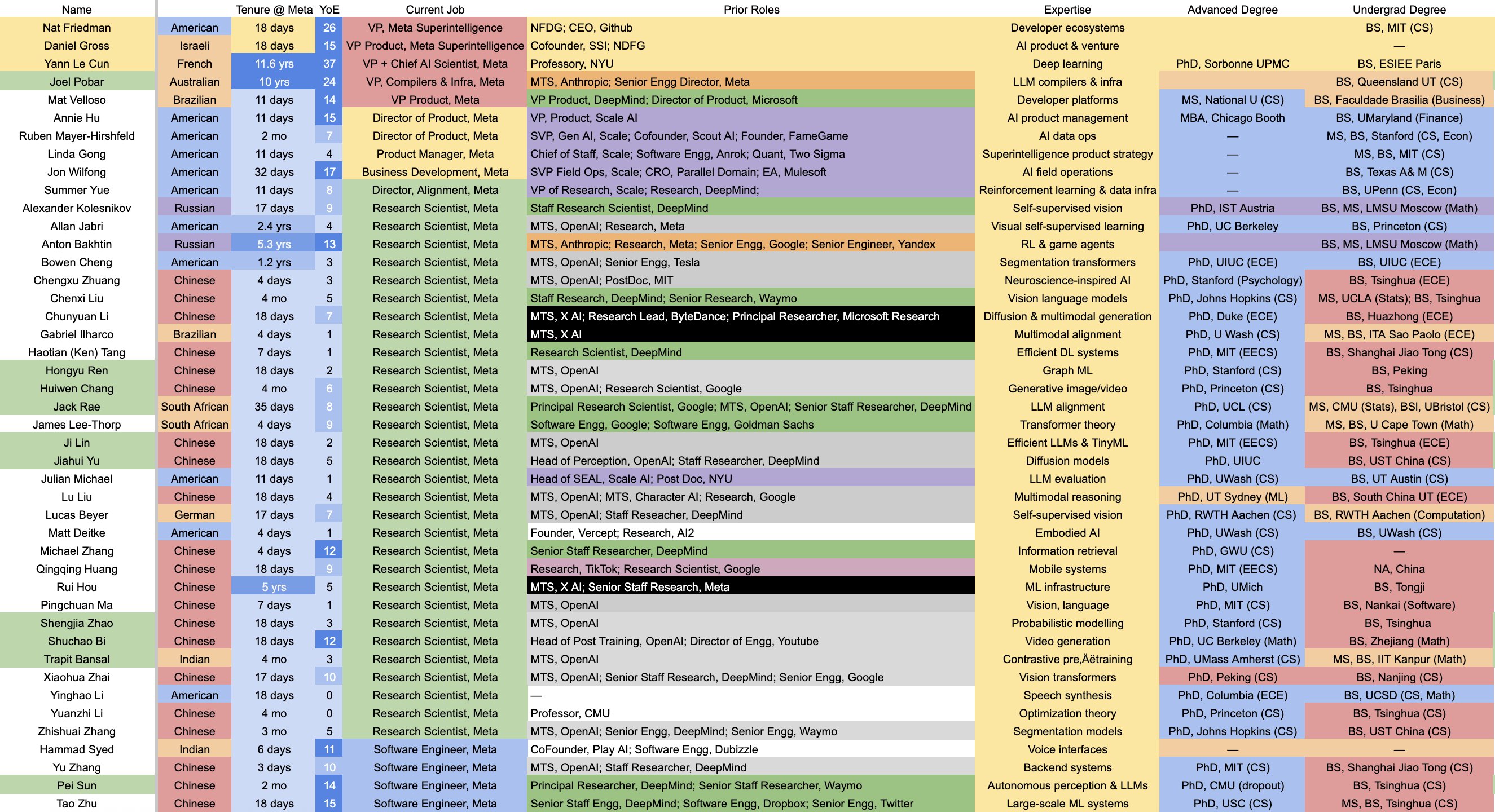AI Summary
Mark Zuckerberg is steering Meta towards an ambitious future centered on "personal super intelligence," a vision distinct from other tech giants' pursuit of artificial general intelligence. Instead of focusing on large-scale problem-solving, Meta aims to develop powerful AI that enhances individuals' daily lives, particularly in areas like relationships, creativity, and productivity. This endeavor is backed by a staggering investment in infrastructure, including "hurricane-proof tents" for rapid data center deployment, and a unique approach to attracting top AI talent by offering massive computational resources over large teams.
Mark Zuckerberg sat across from The Information's Jessica Lessin last week with the unmistakable energy of someone who believes he's onto something big. The Meta CEO was there to outline his most ambitious bet yet: personal super intelligence for everyone.
It's a vision that puts Meta on a collision course with every other tech giant racing toward artificial general intelligence, but with a twist that could fundamentally reshape how we think about AI's role in our daily lives.
The Personal Intelligence Revolution
While OpenAI, Google, and Anthropic compete for influence and control over the future of intelligence itself, Zuckerberg is placing a different bet entirely. His vision of "personal super intelligence" isn't about building one massive AI to solve humanity's grand challenges. Instead, it's about putting powerful AI directly into individuals' hands to enhance their personal lives.
There's another side of this which is like what are the things that people care about in their own live. And some of that is productivity but a lot of it is relationships and culture and creativity and having fun and enjoying life.
Think about it this way: while other companies are building AI assistants to help corporations optimize supply chains or researchers discover new medicines, Meta wants to create AI that remembers the five interesting topics from your morning coffee conversation and follows up on them throughout the day.
This isn't just philosophical positioning. It represents a fundamental disagreement about where AI's most transformative impact will come from. Meta is focusing its superintelligence work on productivity, as well as personal relationships and creativity, betting that billions of people care more about improving their daily interactions than solving abstract global problems.
The Infrastructure Arms Race
Zuckerberg's personal AI vision requires unprecedented computational power, and Meta is building infrastructure on a scale that would make even tech giants pause. The company is constructing data centers so large they cover "a significant portion of the footprint of Manhattan," with one facility scaling to 5 gigawatts of power.
But here's where it gets interesting: Meta is housing these servers in what Zuckerberg calls "hurricane proof tents." It sounds almost absurd until you understand the strategy. Traditional data centers take years to build, but Meta's weatherproof tent approach lets them deploy compute power in months, not years.
The company plans to bring its first supercluster, Prometheus, online next year, with a second facility called Hyperion following behind. These aren't just data centers; they're massive compute clusters designed specifically for training AI models that can improve themselves.
The financial commitment is staggering. Zuckerberg acknowledged spending "hundreds of billions of dollars" on compute infrastructure, but he frames it as a competitive advantage rather than a burden. Unlike AI startups that need to raise capital, Meta's advertising business throws off enough cash to fund this infrastructure race entirely from internal resources.
The Talent War Gets Personal
Perhaps nothing illustrates the stakes better than the current battle for AI talent. Mark Zuckerberg, frustrated with Meta's shortfalls in AI, is assembling a team of experts to achieve artificial general intelligence, recruiting from a brain trust of AI researchers who've met with him personally at his homes in Lake Tahoe and Palo Alto.
Reports of $200 million compensation packages have dominated headlines, but Zuckerberg pushes back on the idea that it's just about money. "The best researchers basically like historically when I was recruiting people to different parts of the company you know people are like okay what's my scope going to be and you know Here people say I want the fewest number of people reporting to me and the most GPUs."
This reveals something crucial about how AI research has evolved. Traditional tech hiring focused on giving talented people the biggest possible teams and budgets. Today's AI researchers want exactly the opposite: small teams with massive computational resources. It's a fundamental shift that plays to Meta's strengths.
While engineers at OpenAI are eight times more likely to leave for Anthropic, and DeepMind engineers are leaving at an 11:1 ratio in Anthropic's favor, Meta is creating an entirely new dynamic by offering researchers both cutting-edge compute and the opportunity to build something from scratch.
The Glasses That See Everything
Zuckerberg's personal AI vision ultimately lives or dies on hardware, specifically the
Ray-Ban smart glasses that Meta has been quietly perfecting. These aren't just cameras you wear on your face; they're the delivery mechanism for ambient intelligence that could fundamentally change how we interact with information.
"In the future, if you don't have AI glasses, you're basically going to be at a cognitive disadvantage," Zuckerberg predicted. The vision he outlined feels both futuristic and oddly practical: AI that can see what you see, hear what you hear, and proactively follow up on the interesting threads from your conversations that you never have time to pursue.
Imagine walking out of a meeting and having your AI glasses automatically research the three books someone mentioned, find relevant articles about the industry trends discussed, and schedule follow-up conversations with the most interesting contacts you met. It's ambient intelligence that augments your natural curiosity rather than replacing your decision-making.
This hardware integration gives Meta a potential advantage that pure software companies lack. While others build AI assistants that live on your phone or computer, Meta is creating AI that travels with you through the physical world, constantly learning and helping.
The Business Model Mystery
For all of Zuckerberg's confidence about the technical vision, one crucial question remains unanswered: how exactly does personal super intelligence make money? Meta's current business model revolves around advertising revenue from social media platforms, but personal AI presents a fundamentally different value proposition.
Will people pay subscription fees for AI that manages their daily lives? Can Meta monetize the data generated by ambient intelligence without crossing privacy lines that consumers won't tolerate? Or will the company find ways to integrate advertising into AI-mediated experiences in ways that feel natural rather than intrusive?
Zuckerberg seems confident that demand will create its own business model, pointing to Meta's financial strength as evidence they can afford to figure it out along the way. "We have a very strong business model that throws off a lot of capital," he noted, suggesting Meta can invest in the future without immediate revenue pressure.
This luxury of patient capital might prove decisive. While competitors need to demonstrate clear revenue paths to investors, Meta can focus purely on building the best possible user experience and worry about monetization later.
The Self-Improvement Revolution
Perhaps the most intriguing aspect of Zuckerberg's vision involves AI systems that can improve themselves. "We are already seeing glimpses of the models even based off of
Llama 4 improving the Facebook algorithm and other AI systems across the company autonomously," he revealed.
This isn't just about building better chatbots. Self-improving AI could fundamentally change how Meta develops products, with AI systems automatically optimizing everything from content recommendation algorithms to user interface designs. It's a vision of compounding technological advancement where each improvement enables faster subsequent improvements.
The implications extend far beyond Meta. If successful, self-improving AI could create insurmountable advantages for companies that achieve it first. The gap between leaders and followers could grow exponentially rather than linearly, potentially reshaping the entire competitive landscape of technology.
The Stakes Have Never Been Higher
Anthropic said
Claude Opus 4 can perform thousands of steps over hours of work without losing focus and decided it's so powerful that researchers had to institute new safety controls. The AI field is advancing so rapidly that even leading researchers are surprised by their own progress.
Zuckerberg believes we should "act as if" super intelligence will arrive in the next 2 to 3 years, even if the timeline remains uncertain. This urgency is driving unprecedented investment across the industry, with the U.S. Department of Defense
granting contract awards of up to $200 million for AI development at Anthropic, Google, OpenAI and xAI.
But while others race toward AGI as an abstract goal, Zuckerberg is betting on a more intimate vision: AI that knows you personally, understands your interests, and actively helps you live a richer, more connected life. It's a fundamentally human-centered approach to superintelligence that could prove more compelling than grand promises about solving global challenges.
Recent Posts

